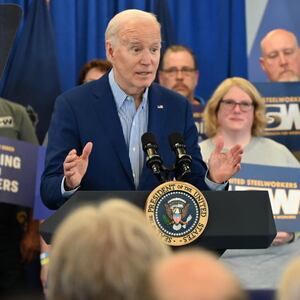President Joe Biden’s baffling suggestion that his uncle might have been eaten by cannibals after a plane crash off Papua New Guinea during World War II has, unsurprisingly, not gone over great with the people who actually live there or have carefully studied the region’s history.
The Democrat made the comments Wednesday while discussing the fate of Ambrose Finnegan, whom he affectionately referred to as “Uncle Bosie.” “He got shot down in New Guinea, and they never found the body because there used to be—there were a lot of cannibals, for real, in that part of New Guinea,” Biden said.
The comments immediately drew scrutiny as, for one thing, they seemed to be a major departure from the Pentagon’s Defense POW/MIA Accounting Agency’s version of what happened to Finnegan. The war records say his plane went down for “unknown reasons” on May 14, 1944, during a courier flight heading to New Guinea.
But others have bluntly questioned why Biden would make the remarks at all.
“I thought: ‘Oh my God, what’s he doing?’ It’s crazy,” Jonathan Ritchie, a historian at Australia’s Deakin University, told The Daily Beast. Deakin, who was born and raised in Papua New Guinea and whose research has focused on the country, said his initial reaction was that Biden was repeating the “same old” trope about PNG.
“You hear it in a number of different ways,” Ritchie said. “You could go out to a pub in Melbourne and talk about Papua New Guinean people, and people would go: ‘Oh, they’re all cannibals up there.’ That’s bad enough. But when the American president suggests something like that, it’s really upsetting.”
Ritchie, who worked with others on a large oral history project recording Papua New Guineans’ experiences of World War II between 2013 and 2018, added that Biden’s comments were something of an “own goal” at a time when the U.S. is hoping to work with Papua New Guinea amid tensions in the Pacific with China.
“Anyone who knows anything about PNG knows the U.S. is a really powerful ally, a great friend of Papua New Guinea,” Ritchie said. “And not just for contemporary political reasons—there is a long memory about the great support that Papua New Guineans gave to the American military during World War II.”
He added that you could imagine “Biden’s advisers—especially those perhaps in the State Department who know something about PNG—cringing, thinking: ‘Oh shit, why did he say that?’”
Michael Kabuni, a lecturer in political science at the University of Papua New Guinea, separately told The Guardian that while cannibalism has been practiced by some communities in specific contexts—like eating a dead relative out of respect to prevent bodily decomposition—referring to cannibalism out of context was not acceptable. “They wouldn’t just eat any white men that fell from the sky,” Kabuni told the newspaper.
Allan Bird, the governor of Papua New Guinea’s East Sepik province, told The Guardian he was “lost for words” when he heard Biden’s comments. He added that he wasn’t offended but instead found the remarks “hilarious,” speculating that the American president had simply heard stories of cannibalism from his own parents and they had stayed with him for the rest of his life.
In a statement Wednesday, White House spokesman Andrew Bates said Biden was “proud of his uncle’s service in uniform,” adding that Finnegan “lost his life when the military aircraft he was on crashed in the Pacific after taking off near New Guinea.”






